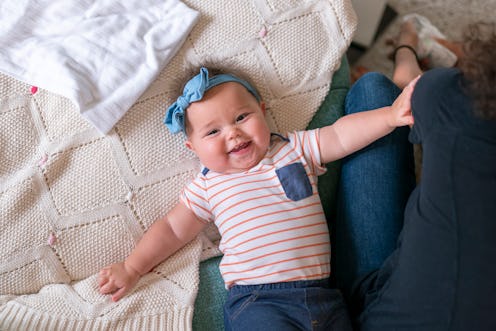Life
The Science Behind Why Babies Are So Darn Cute

When you're huddled over your iPhone, cry-laughing while you watch a video of a baby saying a curse word by accident or drooling mindlessly, do you ever stop to ask yourself why we think babies are so cute? I mean, literally, why do our brains translate that doughy, round, body covered in folded skin and shielded by no hair, cute? Why do our brains see drool and say "Aw"? While do our brains smell their milk breath and say "yum"? It's the same reason our brains hear high-pitched unwavering wailing and say "Poor thing"! And the same reason our brains smell a poopy diaper and say "How can I help?". You see, human babies are of the most helpless babies there are — they literally cannot function without the help of another adult human. It's months before they even have the strength to lift their head. If left alone, they'd be stuck, immobile, unable to find food, water, or distance themselves from their own waste.
In a recent study published by Oxford University in the journal Trends in Cognitive Sciences, researchers have found proof that said "cuteness" is evolutionarily designed to appeal to all of our senses, whether we're men, women, parents, or childless. The most powerful trait a baby can have, is cuteness — the cuter the baby is, the more it appeals to our senses, the more it appeals to our senses, the more we're willing to offer care. Meaning, babies depend on being cute for survival. But what is cute? Is it a button nose? Is it big baby eyes? Is it soft skin and innocent laughter?
Science says it's all that and a bag of chips. Basically everything that a baby is and does elicits the inner caregiver in all of us, because without that capability, the human race would have been stunted a long time ago. So it's not coincidence that we ogle over babies. It's science. It's our evolutionary building blocks that have lead to the advance of the human race.
Most other animals know how to exist from birth. Sure, the longer it's with its mother, the more it will learn and the more capable it will be come and the better chance it has for survival. But from birth, other animals can stand. They can walk into the shade. They can find their mother's nipple. They can hide from certain dangers and communicate with their kind.
Humans, on the other hand, clearly do not have that evolutionary advantage. These days a lot of babies are born into the hands of doctors with the help of medicine and machines. They are then put through a series of tests and attached to various devices all before they even meet their mothers. And still, for many months, human babies are just loud, helpless, poo-machines — who more than happen to be cute. Really cute. Really stinking cute.
So next time you're ogling at a baby, be it on your phone or in the flesh, you tell that baby that it's nothing more than a conglomeration of physical and chemical algorithms that trick the human brain into receiving its image through a positive lens. Or, continue to coo and make goofy faces, because babies. So cute.
Images: Fly View Productions/E+/Getty Images, Giphy